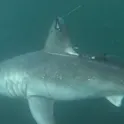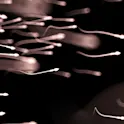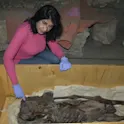
Featured news
05 Sep 2024
Will humans accept robots that can lie? Scientists find it depends on the lie
Scientists find that a lie that protects someone’s feelings is acceptable, but lies which misrepresent a robot’s abilities aren’t.

Featured news
05 Sep 2024
Scientists find that a lie that protects someone’s feelings is acceptable, but lies which misrepresent a robot’s abilities aren’t.

Featured news
04 Sep 2024
At Frontiers, we bring some of the world’s best research to a global audience. But with tens of thousands of articles published each year, it’s impossible to cover all of them. Here are just five amazing papers you may have missed.

Featured news
03 Sep 2024
A surprise killing of a pregnant porbeagle shark being tracked near Bermuda left researchers trying to solve an oceanic mystery. From the transmitted data, they were shocked to discover that it was likely eaten by an even larger shark, in what is the first recorded case of its kind

Featured news
30 Aug 2024
Researchers from Finland and Norway developed a new suite of methods for the screening of antivirulence activity of unknown compounds of bacterial origin. The compounds tested had been derived from actinobacteria living inside invertebrates in the Arctic Sea. They found two interesting compounds with strong antivirulence or antibacterial effects against enteropathogenic E. coli. These results demonstrate the potential of prospecting novel habitats for promising new antibacterial drugs, to solve the current global antibiotics crisis.

Featured news
28 Aug 2024
Researchers found that students who struggle with skills essential for academic success thought that using AI tools is particularly helpful for schoolwork

Featured news
23 Aug 2024
Researchers from Argentina compared semen quality between men infected with high-risk (HR-HPV) and low-risk (LR-HPV) genotypes of human papillomavirus and HPV negative men. They showed that HR-HPV positive men had higher percentages of dead sperm, a higher level of reactive oxygen species, and a lower count of white blood cells in their semen. These results suggest that HR-HPV positive men, but not LR-HPV positive men, may have lower fertility due to oxidative damage to sperm.

Featured news
22 Aug 2024
In this guest editorial, inspired by his new article in Frontiers in Quantum Science and Technology, Prof Carl Kocher explains his groundbreaking 1964-67 experiments in quantum entanglement and helps us stretch our minds to understand this apparently paradoxical phenomenon.

Featured news
16 Aug 2024
Scientists find that taking part in creative activities boosts people’s sense that life is worthwhile, their happiness, and their satisfaction with life.

Featured news
12 Aug 2024
Investigating the potential and the risks of young people's relationship with technology.

Featured news
08 Aug 2024
Researchers have measured the diversity of microbes inside microwaves for the first time. They showed that microwaves harbor a specialized community of locally adapted microbial genera, which resembles that reported on kitchen surfaces and in another extreme, highly irradiated habitat: on solar panels. This finding has potential biotechnological applications, in processes that require microbes resistant to thermal shock, radiation, and desiccation.

Featured news
07 Aug 2024
Scientists equipped Australian sea lions with cameras and used the video data to identify unknown ocean habitats in southern Australia

Featured news
06 Aug 2024
At Frontiers, we bring some of the world’s best research to a global audience. But with tens of thousands of articles published each year, it’s impossible to cover all of them. Here are just five amazing papers you may have missed.

Featured news
05 Aug 2024
Scientists find that trees on streets exposed to artificial light at night have tougher leaves and are less likely to be eaten by insects, potentially damaging urban biodiversity

Featured news
02 Aug 2024
Researchers from Egypt used state-of-the-art techniques to ‘virtually dissect’ a female mummy from the New Kingdom, named the ‘Screaming Woman’ for her remarkable expression. They showed that she had been embalmed with costly imported frankincense and juniper. There was no obvious cause of death, but the mummy’s wide open mouth may be due to cadaveric spasm, which is typically associated with dying in considerable pain and under strong emotions.

Featured news
01 Aug 2024
The science behind athletic performance to achieve gold at events like the 2024 Paris Games.
Get the latest research updates, subscribe to our newsletter